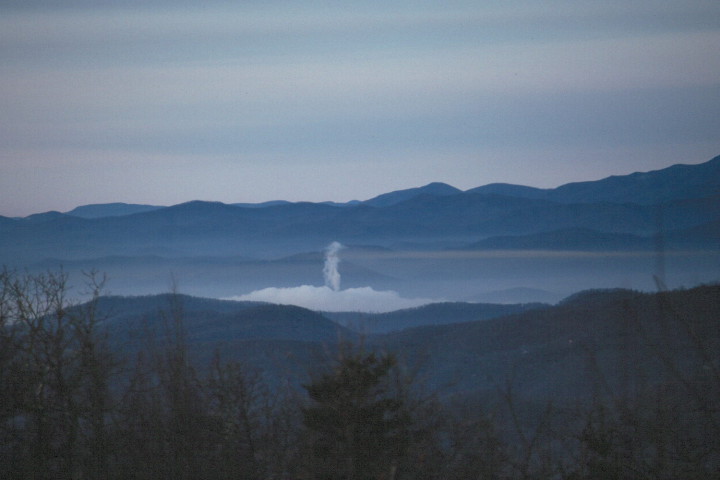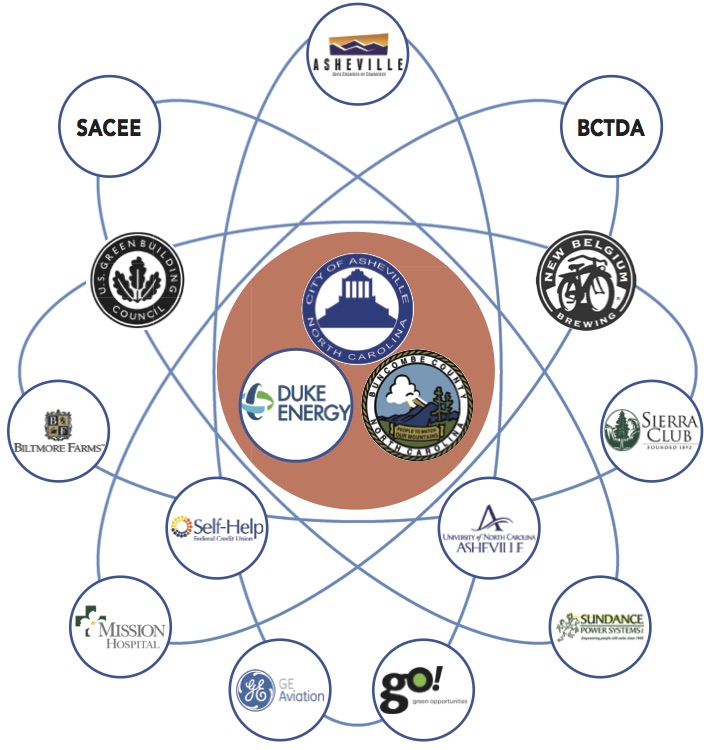At hearings before the state Utilities Commission earlier this year, Duke Energy pledged to make every effort to slow the growth of power demand in the region.
To keep that promise, the utility provider has now entered into a groundbreaking collaborative partnership with the city of Asheville, Buncombe County and members of the Western North Carolina business and nonprofit communities to create new approaches to meeting the area’s future energy needs.
While similar partnerships have yielded promising results for reducing energy use and minimizing new fossil fuel power plants elsewhere in the country, the local partnership will be the first of its kind in North Carolina.
Since Duke Energy announced plans last May to replace its coal-fired Lake Julian power plant, the company has encountered significant community opposition to its modernization proposals.
In November, Duke’s initial scheme to run a new high-voltage power line into the region was scrapped in the face of public concerns about the impact of the lines on views and property values.
The utility then presented a revised plan calling for two new gas-fired units at Lake Julian, with a third to be built by 2023 if electricity demand continues to grow. Activists successfully lobbied the N.C. Utilities Commission to withhold approval of the third unit, but the other two were given the green light on Feb. 29.
Avoiding or delaying the need for the third unit, says Jason Walls, Duke’s local government and community relations manager for the Asheville area, is the main objective of the new Energy Innovation Task Force.
Achieving that goal, he notes, will require reducing growth in both overall and peak demand. This could be done through a combination of strategies, such as increased promotion of existing energy-efficiency and demand-reduction programs, creating new incentive programs, and making strategic investments in renewable energy with utility-scale battery storage.
“That’s in principle,” Walls explains, adding that the exact strategies haven’t been determined yet.
The Energy Innovation Task Force, the first group of its kind in North Carolina, comprises 16 members representing a wide variety of interests: environmental advocacy, nonprofits, institutional and industrial customers, development, tourism, finance, alternative energy, higher education and manufacturing, in addition to local governments and Duke Energy itself.
Both the Asheville City Council and the Buncombe County Board of Commissioners have passed resolutions recognizing the task force, though not without some controversy in the latter case. Commissioners Miranda DeBruhl, Mike Fryar and Joe Belcher expressed dissatisfaction with what they saw as a lack of openness in the process of determining who would serve on the committee.
“I think this is the wrong execution of the right idea,” said DeBruhl, who joined her fellow Republicans in voting against authorizing the task force at the commissioners’ April 5 meeting.
A new attitude
Duke Energy’s recent commitment to explore new strategies for reducing energy demand, says task force member Sonia Marcus, has created the opportunity to inject “some real substance and funding into our clean energy programs.” Marcus, the director of sustainability at UNCA and the chair of the city’s Sustainability Advisory Committee on Energy and the Environment, led an effort last year to jointly develop a Community Clean Energy Policy Framework with the utility.
Asheville City Council member Julie Mayfield will represent city government on the task force. As co-director of MountainTrue, a local environmental group, Mayfield was deeply involved in the nonprofit’s efforts to defeat Duke’s transmission line project last year. Her organization also partnered with the Sierra Club and the Southern Environmental Law Center to file documents with the Utilities Commission opposing some aspects of Duke’s proposed modernization plans.
In the wake of the resistance the utility encountered, it now recognizes the need for “taking real action” to address consumers’ demands to reduce reliance on fossil fuels, says task force member Brownie Newman, the vice chairman of the Buncombe County Board of Commissioners.
Newman previously worked for FLS Energy, which bills itself as “a full-service solar energy provider.” Last year, he launched his own company, Headwaters Solar. To avoid any conflict of interest, Newman says his business will have no involvement in any Duke Energy project related to the task force’s work. “I am serving on this task force because I’m passionate about creating a sustainable energy future for this region,” he explains. “I will represent my Buncombe County constituents on the task force, not my business.”
We’re in business
New Belgium Brewing’s Jim Spencer won’t have to worry about separating his business interests from his role on the task force, since he’s representing industrial customers that use a lot of electricity. “Businesses have a responsibility to implement and measure clean energy solutions in our own operations,” says Spencer, New Belgium’s director of engineering. In his work with the task force, he’ll draw on the company’s experiences as a partner in the public-private FortZED initiative in Fort Collins, Colo., where the brewery’s energy demand management has contributed to significant reductions in peak power loads citywide.
Sonya Greck, a senior vice president at Mission Health, will represent large institutional customers on the task force. “As Mission Health embarks on the largest facility development in its history, the Mission Hospital campus consolidation project provides a unique opportunity to invest in infrastructure that will improve energy efficiency and encourage innovation,” says Brian Moore, the organization’s executive director of public policy and regulatory relations.
Other task force members representing business interests include Paul Szurek of Biltmore Farms, hotelier Himanshu Karvir (serving on behalf of the Buncombe County Tourism Development Authority), Toby Weas of the Asheville Area Chamber of Commerce, and a yet-to-be-named representative of GE Aviation.
Underserved communities
For lower-income consumers, utility costs make up a larger portion of monthly household expenses. And as George Jones of Green Opportunities points out, the housing stock in disadvantaged communities is often older and less efficient than newer construction.
Accordingly, says Jones, the local nonprofit’s executive director, he’ll focus on helping Duke Energy design and promote programs that lower energy bills for consumers in underserved communities while reducing overall power demand. He’ll also urge the utility to train and hire workers in those communities for well-paying jobs in the alternative energy industry.
Jane Hatley of the Self-Help Credit Union will be another voice for those communities. Her organization provides loans to low-income business owners to finance energy efficiency improvements that also improve the bottom line, she says. Self-Help has provided seed funding for startup companies in the alternative energy industry, continues Hatley, including FLS Energy and Blue Ridge Biofuels.
High-level task forces are often made up of members drawn from a select fraternity, she observes, adding that she sees the new group’s inclusiveness as a positive sign.
Environmental perspectives

Anyone who doubts that task force members hold widely varying views hasn’t talked to Dave Hollister, president of Sundance Power Systems. “The process for approving Duke’s two new gas plants was a completely unconstitutional process that rammed those things down our throats,” Hollister maintains — and he’s just getting warmed up.
“The Legislature passed a special bill which upended the normal public process and commits billions of dollars to putting our community on an unsustainable course for the next 30 to 40 years,” he continues. “So unless we acknowledge that, we can’t talk with an honest face about what’s happening here.”
With that disclaimer out of the way, though, Hollister’s tone becomes more hopeful. “The opportunity we have now is to figure out how we can become more efficient and utilize demand-side management, energy storage and renewables to make sure we have a reliable supply of energy that doesn’t destroy our planet,” he says. And while Duke’s part in the process can’t be overstated, the public also has an important role to play.
“People in this region have the lowest rate of participation in energy programs in the state,” notes Hollister, though he also says the programs offered here are cumbersome and difficult to use. His own company, continues Hollister, tried to use a Duke program to offset the cost of some energy upgrades at Sundance Power’s offices. “We’ve been put through the wringer,” he complains, saying that months after the project’s completion, Sundance still hasn’t seen any of the promised reimbursement. “There are programs in other parts of the country that people want to use, but customers have to see enough benefit. We’re going to have to share responsibility and step up our game to be successful,” Hollister concludes.
Sam Ruark-Eastes, executive director of the WNC Green Building Council, says his organization brings know-how about creating and implementing successful local energy efficiency programs. Since 2005, he points out, “We have certified over 1,150 homes in the Green Built NC rating system and 262 LEED homes. Each of these has a much lower energy footprint than a code-built home.”
Ruark-Eastes previously oversaw the implementation of a successful energy efficiency program in Sonoma County, Calif. The local utility there funded incentives, energy audits and project management to support improvements aimed at reducing energy demand. Ruark-Eastes says he’s looking forward to bringing the fruits of that experience to the task force’s work.
The Sierra Club’s Kelly Martin will also represent environmental interests on the committee.
Kick-starting the process
Seeking good ideas, seven task force members are planning to attend the Rocky Mountain Institute’s Electricity Innovation Lab Accelerator, slated for April 24-27 at the Sundance Mountain Resort in Utah. The Boulder, Colo.-based nonprofit promotes “the efficient and restorative use of resources,” according to its website.
Representing the city of Asheville will be Mayfield and Cathy Ball, executive director of planning and multimodal transportation; Newman will represent the county. Longtime community energy activist Ned Doyle will attend, as will Duke Energy executives Robert Sipes, Jon Landy and Walls. The program costs $1,300 per participant, plus airfare. The city and county have paid the registration fees and expenses for their representatives.
In an email to task force members, Walls said the event presents an opportunity to “work with some of the best in the business around energy innovation and ways for collaborative efforts to succeed.” He added that he hopes to leave with “a map to how we can find some mutually beneficial solutions to reduce peak energy demand in our region.”
With WNC’s energy future on the line, the stakes could hardly be higher. “There is a lot of goodwill, good energy and good brainpower going into this initiative,” says Marcus of UNCA. “The trick is not to squander that.”




This could be the beginning of a game-changing effort here in WNC and could have impacts through-out NC and the region. Great work again, Virginia! This is complex issue and once again you’ve done a great job laying out a solid overview.
Thanks for reading (and the nice compliment!), Michelle, and thank you for all your action around energy and other important issues.
I used the term “energy innovation” during 2015 SACEE exchanges I had. Here is the only pre-2016 reference to the term energy innovation connected to Asheville available in an Internet search:
http://www.citizen-times.com/story/opinion/contributors/2015/01/02/solution-asheville-megawatts-change/21186705/
Remember when we used to turn the lights off?
conservation is free to all, and the fastest, cheapest, most effective way to save energy. If every city office (and resident) turned off all computers, printers, and monitors , and lights, every night and on weekends it would be a great start. Get the schools to do the same, turn everything off when not being used. While we can talk about great plans for reducing energy use, this can be done now with no budget, then upgrade your housing stock, install solar water heaters, and move ahead with efficiency and renewable developments. If we can’t get people to turn stuff off, we are doomed, and will never have enough energy.
I have saw one Duke Energy efficiency related TV ad that ran a few times over a year ago about a refrigerator upgrade program. Nothing since.